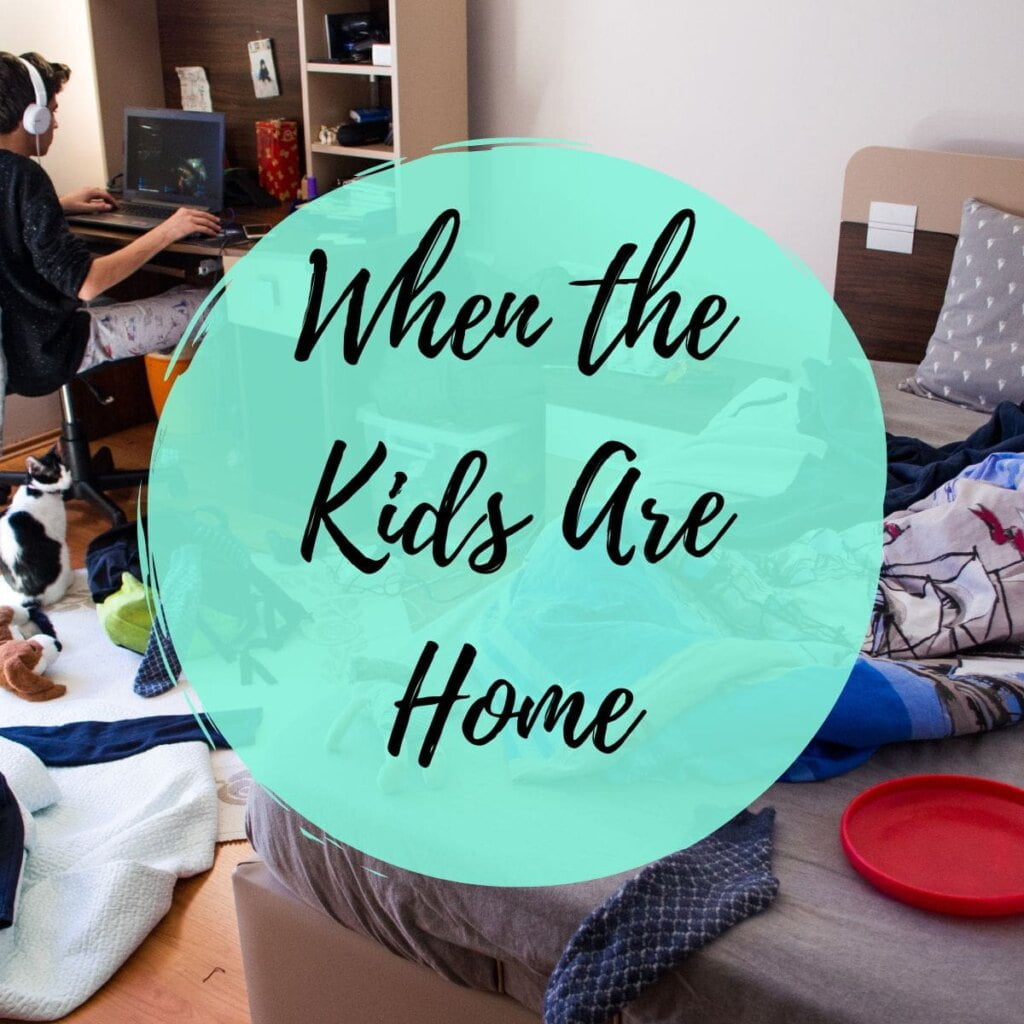We all know what to expect for Spring Break and Summer. Most parents sign the kids up for camps and sports, schedule regular playdates with friends, or enroll in all-day care programs like the YMCA or the Boys & Girls Club. But what do you do when camps and activities are cancelled, care programs are shut down, and the kids are stuck at home? I know parents who’s eyes glaze over at the thought of being stuck with their kids 24 hours a day, but it doesn’t have to be exhausting. Take a deep breath. We’ve got your back. Here are a few tips to help you make the most of the time when the kids are home.

Set Boundaries
Some kids think that schooling from home means they have free time…all the time. Establish boundaries and limits with your kids. Setting expectations about what needs to be completed before turning on video games or texting their friends is helpful. Decide what works best for your family, but here are a few ways to handle the work/free time battle:
- Create a schedule that works for you and your family.
- Require all school work to be completed before any electronic devices are turned on.
- Or, For each completed assignment, 15 minutes of electronics is allowed (or whatever you deem appropriate for your family).
- Time using electronics must be equal to physical activity, i.e. 1 hour of Fortnight means they’ll spend 1 hour shooting hoops, walking the dog, skating in the front yard, etc. No excuses.
- Get everyone to pitch in. Kids are resourceful and you don’t have to wait on them hand and foot. Find ways for each child to contribute to lessen the load – older siblings can help younger siblings with their school work, kids are capable of making sandwiches and other easy meals and can manage yard work and pet care.
- Chores are mandatory. Restrict free time, electronics, and other privileges if chores aren’t completed. Give the kids a chore schedule and expect them to follow it. There’s no excuse for not helping to keep the house when they’re primary users.
- Appropriate behavior is non-negotiable. Whining, talking back, refusing to do assigned work, slacking on chores, instigating fights among siblings, all get old quick. Establish ahead of time what consequences are for unacceptable behavior – taking away electronics, adding extra chores, etc. so that you can follow through immediately.
Chores & Responsibilities
Kids who have chores are more self-confident, self-reliant, and respectful, and being accountable for responsibilities around the house leads to a strong work ethic later in life. Work with your kids to determine what chores are appropriate and be clear about the duties involved. My kids share a bathroom and they are responsible for keeping it clean. When I tell them to clean the bathroom, they know that means to wipe down the counters, clean the mirror, clean the sink, pick up the laundry, and empty the trash can. I clean the toilet and the tub, but they handle the rest. We also have a handheld vacuum cleaner that I use to put them to task around the rest of the house, they have a duster for cleaning the baseboards, and they know how to empty and load the dishwasher.
Managing Chores
- Amazon has super cute dry erase chore charts that you can stick to your fridge or other magnetic surface.
- Make it fun and change things up with Chore Sticks…they suggest specific jobs like filling soap dispensers and putting dirty laundry in the hamper. There are 42 pre-printed sticks and 8 blank sticks so you can create your own. Also includes a few surprise sticks for fun, like sing and dance to a song.
- Printable chore charts are easy to manage. Print up new ones every week. The Cultivated Nest shares printable charts for all ages, including charts with pictures for the littles. If you’re crafty…even better, task the kids with creating one of these creative chore trackers to keep them busy.
Make Learning Fun
When the kids are at home instead of the classroom, they have alternatives to learning – and access to learn almost anything. Here are a few websites to check out to encourage kids to keep learning outside of their regular classwork.
- Steve Spangler Science has been a homeschool favorite for years. With cool science-themed YouTube videos, all the supplies you could ever need for learning about all things science, and a club subscription that comes with a monthly kit with 5 to 10 experiments in each box to teach and engage. They have an online experiment library with guides so kids can explore what interests them and find something fun to try.
- Try out the free versions of popular online learning programs and public access to educational sites. A few of our favorites are:
Many museums, aquariums, and other cultural centers are offering virtual tours and have online resources as well as printable material for complete lessons about animals, science, history, and more. Also, National Park Service and many state parks offer junior ranger and educational programs with online elements and printable activity pages. There are endless opportunities to find engaging material, and these days, it’s so easy to find.
Go Outside
Kids today spend so much time indoors…and when they are outdoors, they are often participating in an organized sport. Go on a hike. Go to the beach. Go fishing. Do something outside, together – you’re all home anyway, build in outdoor family time. The time spent connecting and making memories are precious. Take advantage of this opportunity.
Encourage Creativity
We have a collection of activity books and supplies for crafts, projects, and science experiments. Sure, creating on Minecraft is cool, but screen-free creativity is necessary. Challenge them to get creative: Make a comic book, write a story, build a diorama, make something out of clay (or playdough), draw a self portrait, write a song, create new rules for a board game and play it with a sibling or friend, build a domino maze. Kids shouldn’t always have to rely on step-by-step guides or adult-given instructions…remember the days we literally had nothing to do when after-school cartoons were over? Kids need to use their imagination just as much as they need to brush up on their tech skills and math proficiency. So let them get bored. We’re all so used to being busy…this is a chance for us to take a step back, connect at home, explore things we’re interested in, and remember what it was like to use our imaginations.
Related Articles
| How To Get Started With Homeschool | Library Card Benefits |
| Private Schools In Orange County | Orange County Libraries |
| 140+ Things To Do With Kids | Online Educational Resources |
